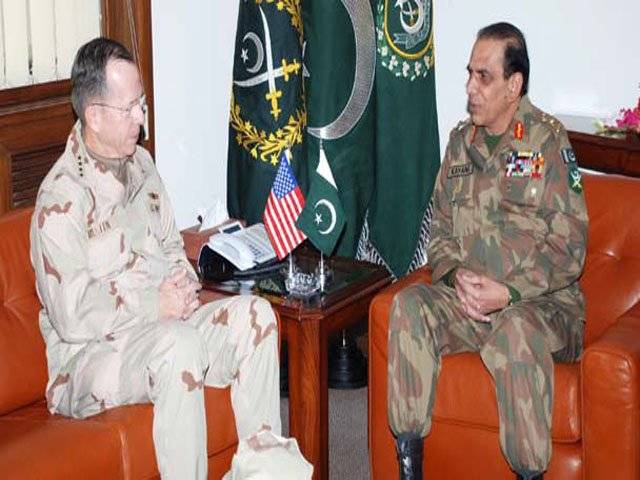President Barack Obamas top military adviser said Pakistans army has pledged to go after militants the U.S. wants targeted in an area harboring al-Qaeda that has become the epicenter of terrorism. Navy Admiral Mike Mullen, chairman of the Joint Chiefs of Staff, said his Pakistani counterpart, General Ashfaq Parvez Kayani, has given assurances he will mount an offensive the U.S. has long called for in North Waziristan along the Afghan border. Mullen cited as evidence for his optimism Pakistans offensives against the Taliban and related groups elsewhere in the country during the past 1 years. Hes committed to me to go into North Waziristan and to root out these terrorists as well, Mullen, 64, said in an interview on Bloomberg Televisions Conversations with Judy Woodruff to be broadcast this weekend. He clearly knows what our priorities are. Mullen said he hadnt read Washington journalist Bob Woodwards latest book on the administrations strategy debates, Obamas Wars. While not taking direct issue with the books suggestions that the military limited Obamas Afghanistan options during a strategy review last year, Mullen said the military provided its best advice. He said the goal was to defeat al-Qaeda and ensure Afghanistan wouldnt again become a haven for the group as it had been before the U.S. ousted the Taliban from power after the Sept. 11, 2001, terror attacks. Thats how I approached my best military advice to the president, Mullen said. North Waziristan is the epicenter of terrorism, Mullen said. Its where al-Qaeda lives. Kayani, who has been an ally of Mullen, has shifted more than 70,000 troops from the countrys border with India, its traditional rival, to the northwest, mobilizing a total of 140,000 forces, Mullen said. Theyve sacrificed, theyve lost a lot of citizens and they are really concerned, urgently concerned, about the threat to their own country from terrorists, Mullen said. Two years ago, that wasnt the case. Still, Mullen didnt give a time frame for a possible offensive in North Waziristan. He said Kayani has primarily targeted groups that pose an internal threat, not those the U.S. considers most dangerous. Mullen, who took office in October 2007, said he has probably been to Pakistan 20 times, seeking to rebuild ties that frayed in the 1990s. The U.S. relationship with Pakistan comes from what I call a very dark hole where we left them, Mullen said. So to assert certainties right now I think is a real challenge. Hes got no government to build behind the offensives, Mullen said. So hes got his forces literally pinned down in Swat until the government can actually come in, provide the security, the police. While military action by the U.S. and its allies in Afghanistan and Pakistan has degraded al-Qaeda, Osama bin Laden is still running the group, Mullen said. Hes struggled doing that to some degree over the last couple of years, Mullen said. Still, the threat to the U.S. is every bit as intense as it has been. And its still a threat that needs to be eliminated. The war in Afghanistan is showing signs of progress in reversing Taliban gains and strengthening legitimate authorities, Mullen said. The U.S. is very committed to beginning a troop withdrawal that Obama called for when he authorized 30,000 additional U.S. forces last December, Mullen said. Im sure well be able to start that transition, he said. We dont know exactly where that will be or how much.
Thursday, April 18, 2024
Gen Kayani had assured of army offensive in NWA: Mullen

Mehwish Hayat says she would like to work with Aamir Khan
9:59 PM | April 18, 2024
'That'll be awesome,' Rohit Sharma on idea of Pakistan vs India Test series
9:17 PM | April 18, 2024
Turkiye commends Pakistan's efforts in fostering regional peace
9:03 PM | April 18, 2024
CM Maryam's security squad hits biker to death in Narowal
9:02 PM | April 18, 2024
Hafiz Naeemur Rehman sworn in as new emir of Jamaat-e-Islami
8:54 PM | April 18, 2024
Hepatitis Challenge
April 18, 2024
IMF Predictions
April 18, 2024
Wheat War
April 18, 2024
Rail Revival
April 17, 2024
Addressing Climate Change
April 17, 2024
Justice denied
April 18, 2024
AI dilemmas unveiled
April 18, 2024
Tax tangle
April 18, 2024
Workforce inequality
April 17, 2024
New partnerships
April 17, 2024
ePaper - Nawaiwaqt
Advertisement
Nawaiwaqt Group | Copyright © 2024





